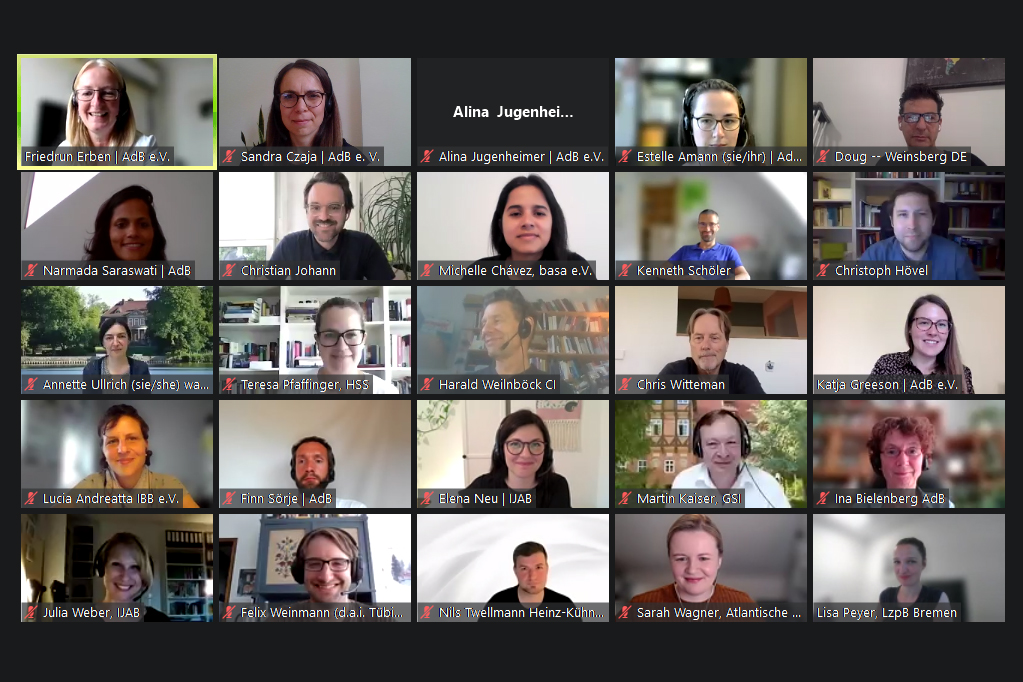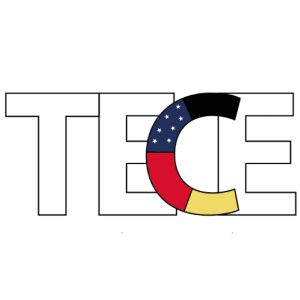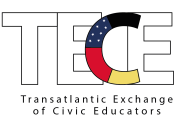

By Team TECE
On May 19, 2022, the online symposium “Transatlantic Challenges, Different Approaches? Civic Education from a German and American Perspective” took place. Participants and speakers from Germany and the USA joined the event. The Arbeitskreis deutscher Bildungsstätten e. V. (AdB) planned, organized and implemented this conference in cooperation with the Berlin State Agency for Civic Education.
The aim of this conference was to bring together people who have not yet dealt intensively with the transatlantic dialogue and the transatlantic perspective on civic education with experienced experts from research and practice and to sharpen their view of transatlantic challenges, but also of the different practices of civic learning.
The idea for this conference has three central origins: First, in the first issue of the AdB journal “Außerschulische Bildung. Zeitschrift der politischen Jugend- und Erwachsenenbildung” on the topic “USA – A Moment of Change?” asked what role civic education and transatlantic exchange can play in strengthening positive developments and newly growing civil society structures and the commitment of people in Germany and the USA. This symposium was meant to continue this discussion.
Second, the AdB project “TECE – Transatlantic Exchange of Civic Educators” has sought to reflect on civic education more comprehensively. The TECE project is a collaboration between AdB and the Tisch College of Civic Life at Tufts University in Boston. The project aims to explore the feasibility and value of German-American exchange specifically in the area of non-formal, out-of-school civic education. What can be learned by taking a comparative look at civic learning in both countries? What topics are most relevant for exchange? And what formats are best suited for this work? At the heart of the TECE project is a core group of TECE Fellows, some of whom also attended the symposium.
Through the TECE project, it became clear that there are many challenges of a transatlantic nature – both for our societies themselves and for political education. Threats to democracy – both from within and without – show us once again how important transatlantic cooperation is. Civic education has an important role to play in addressing these challenges. There is renewed interest from policymakers and also the public in new investments in civic education in both countries. However, we do not often enough look beyond our national or regional horizons to find out how civic education is addressed in other countries. This was another goal of the symposium.
Third, the Berlin State Center for Civic Education’s interest in conference planning is also related to various transatlantic encounters: Since 2016, the organization has been using the rooms of the “Amerika Haus,” which was built in 1957 for the United States Information Agency at the Zoologischer Garten train station and where U.S. foreign cultural policy was made until 2004. But there are also substantive reasons for dealing with this topic: looking across the Atlantic, comparing the political system and political debates of the United States can be a building block for learning about our own political landscape. This has a long tradition – here only the short reference to the American concept of re-education, which has strongly influenced the development of politische Bildung in Germany, to include the development of the structures with state agencies for civic education in all federal states and a federal center for civic education.
Laura Tavares of the WPS Institute kicked off the event with her presentation “Challenges and Opportunities for Civic Education in the USA”, which provided an impressive description of the current situation and sharpened the focus on current challenges such as polarization, structural racism and the crisis of democracy. In breakout sessions, participants were able to exchange ideas on the relevance of these topics for political education in Germany. The most important keywords were recorded in a Padlet and provide a useful basis for further discussion of these topics.
With Andrew Wilkes from Generation Citizen and Makda Isak from EOTO, two proven experts could be won, who looked at the handling of racism and colonial pasts in the two countries from different perspectives and addressed the question of what we can learn from each other here in a discussion open to the participants.
At the end of the symposium, a roundtable discussion on “Why is a transatlantic perspective relevant for civic education and how can we promote exchange? ” was organized. Elena Neu, Project Officer International Youth Policy Cooperation, IJAB, Martin Kaiser, Gustav-Stresemann-Institut in Niedersachsen e. V. – Europäisches Bildungs- und Tagungshaus Bad Bevensen, Ina Bielenberg, AdB Managing Director, and Prof. Dr. Leo Penta, Deutsches Institut für Community Organizing (DICO) discussed which topics are particularly relevant, what support is needed and how more cooperation, dialogue and exchange can succeed.
Some important findings from the contributions and discussions, but also from the TECE project, which require further consideration should be mentioned here:
- As stated in the final conversation: “We have enough in common to be able to understand each other and enough differences to be able to learn from each other”. Nevertheless – especially in the international context, but also with the partners in Germany among themselves – the question needs to be clarified what we actually mean when we talk about politische Bildung, democracy education, civic education, civic learning …. Learning how these terms are understood in other contexts can help us imagine new approaches and ways of thinking about our work. This includes discussing the relationship between civic education and political action, and understanding what it means to actively participate in shaping democracy. Could human rights education be a common ground?
- The less clearly defined notion of what non-formal civic education is in the U.S. makes it possible to go beyond defined professional fields and think about how civic education can be designed differently. This issue, however, has not been protected from the polarized “culture wars” in the United States. Although there is broad consensus that we need more civic education, there is disagreement about how best to do it. Should civic education encourage active engagement of young people? How should educators and youth workers address the issue of racism and the memory of slavery? How neutral can and should civic education be in a highly polarized environment?
- If one looks at the infrastructures for political education in Germany and the USA, very large differences become apparent. In Germany, for example, educational work is strongly supported by public funds, while in the U.S. it is primarily privately funded. In Germany, the professional field is highly institutionalized and there are numerous institutions and associations that define the field of work. In the U.S., on the other hand, there are few professional networks. The CivXNow network is an example of how it is possible in the USA to bring together a large number of organizations that carry out civic education work in very different ways. However, identical structures are not a prerequisite for effective exchange. Rather, it requires an imaginative vision for potential transatlantic partners and deliberate efforts to establish dialogue on an equal footing.
- Influential networks and regional/municipal anchoring of civic education help to strengthen and critically accompany it. Here, too, civic educators in Germany can learn from strong projects in the USA. And vice versa, educational institutions and organizations like EOTO e. V. in Germany show how they can become central places for the development of democracy.
- The boundaries between non-formal and school-based education and between civic engagement and civic education tend to be more fluid in the United States than in Germany. Civic education itself usually takes place in school. This is a legacy of the Founding Fathers, who believed that the primary mission of the public school was civic education. However, there is also a long history of civic learning in out-of-school contexts through community education and civic engagement. Notable examples include the Freedom Schools of the Civil Rights Movement, Community Schools of John Dewey, and the Citizenship Schools of Myles Horton and Septima Clarke.
- Strong civic education is inclusive civic education. This means that approaches must be culturally relevant and responsive to the needs of diverse target groups. It is important to recognize the civic education that has been taking place for many years outside the institutionalized realm by marginalized educational actors. How can we recognize and support this work more? This requires greater cooperation and mutual strengthening of different educational actors. Here we can learn from each other.
- “Civic education must get out of the classroom!” – was said in one of the presentations. How can new spaces for civic education be recognized and opened up? The 16th Children and Youth Report speaks of “underestimated spaces” of civic education that need to be better recognized and strengthened.
- An important keyword addressed was polarization – both in Germany and in the USA. In one session someone said, “We have to try to understand each other better and learn to compromise.” We have to include different perspectives and enable changes of perspective. This applies to societal solidarity, but equally in professional interactions and transatlantic exchange. In the roundtable discussion at the end of the conference, one panelist noted: “Look at your own work through the other person’s glasses” (translated). This is exactly what transatlantic exchange makes possible.
This event is part of a series of conferences launched by the AdB in 2015 for the AdB journal “Außerschulische Bildung. Zeitschrift der politischen Jugend- und Erwachsenenbildung” (Journal of political youth and adult education): Every year an event is held on the thematic focus of the first issue. The background and inspiration for this conference is therefore the issue on the topic “USA – A Moment of Change?“, which was published in mid-March 2022.
